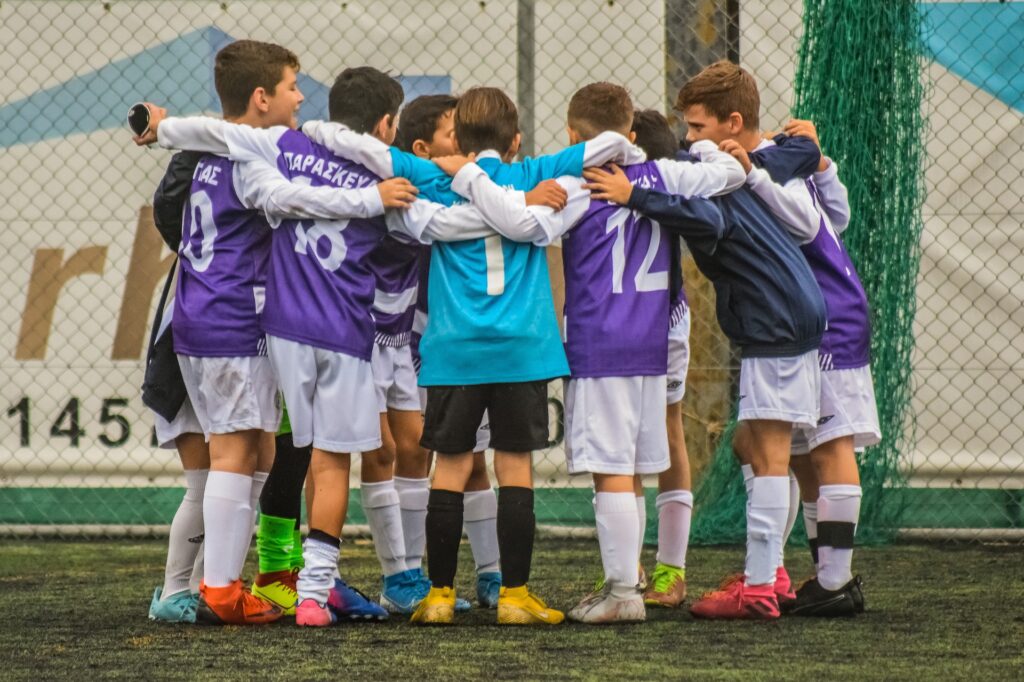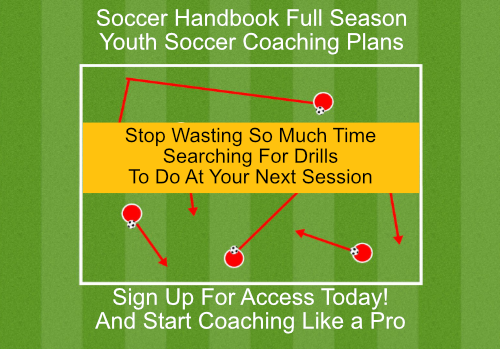It’s never too late or too early to start coaching youth soccer. No matter your age, teams and organizations will always need youth soccer coaches, especially as the sport continues to grow in popularity.
The truth is there’s no one right way on how to coach youth soccer either. And if you don’t know where to start the first time can feel overwhelming.
We’ve assembled eight tips to help first-time youth soccer coaches have as much fun on the sideline as their players do on the pitch.
1. If You’re Coaching Youth Soccer with No Experience: Learn the Rules
If you’re coaching youth soccer with no experience, the best substitute for experience is deep knowledge and understanding of the game’s rules.
Being well-versed in the rules will give you a consistent tactical advantage. It’s crucial to be able to explain and help your players understand them, too. It will also help you avoid unnecessary penalties during game day.

After all, many young players are learning the game for the first time and may struggle with some of the concepts. Having a coach who can easily explain the rules to them is important in helping them develop their on-field awareness.
There are many different rules, so start with learning a few of the most important. Younger kids need to know about the basics, like what a handball is and how and when to handle throw-ins.
When it comes to older kids, the offside rule, for instance, is something that both first-time coaches and players can struggle with. However, it is a major part of the game, so learning this rule — among others — is critical for any aspiring coach.
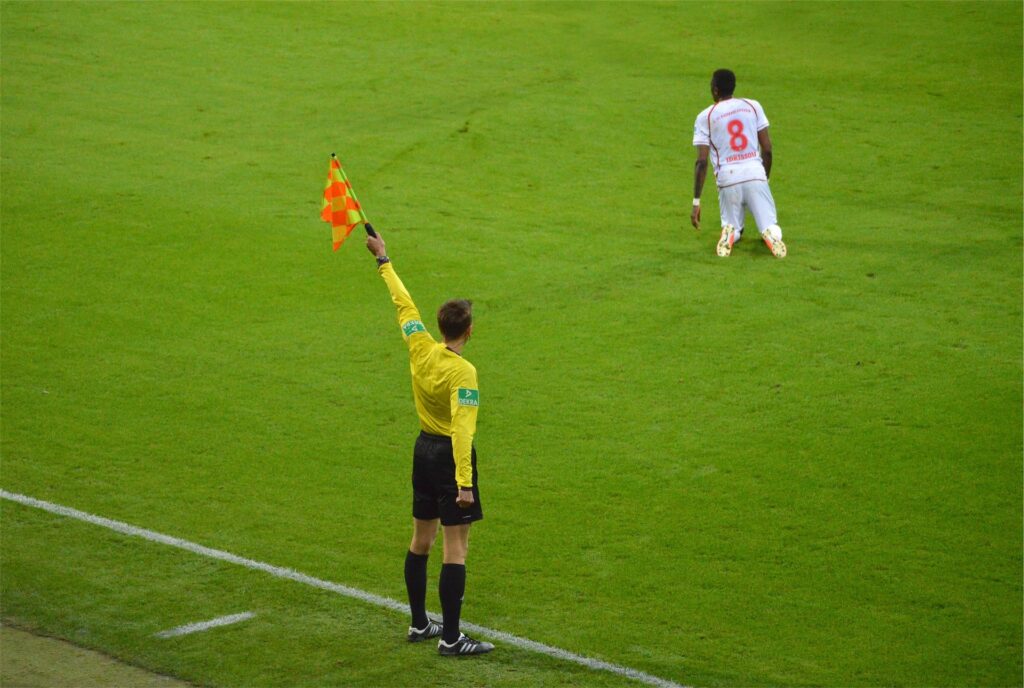
A couple of other rules that first-time coaches may need to learn include how many players are on the pitch at once (eleven, including the goalkeeper), what yellow cards and red cards are, and what free kicks are.
Don’t be too concerned if you struggle to pick up some of the rules at first. With more experience, coaches are bound to gain a better understanding of how the different rules work.
2. Teach in Motion
One of the best ways for young soccer players to learn the rules is while playing. A method of soccer coaching that embraces this philosophy is Play-Practice-Play (PPP).
Play practice play is a way of structuring practice so that each practice starts and ends with fun, low-pressure, free play.
As a coach, you observe the first play session, allowing players to form small-sided pick-up games. Watch for natural teaching moments that occur in live play, like any fouls that occur, but it’s important not to interrupt the games or the flow of play.
You can direct arriving players to already-established games as they’re getting their cleats on.
Following the first play session is the practice session. This is the time to work on skills and drills. This is also the time when the most direct teaching occurs, but make it fun. As players work on the drills, you can explain why this activity is important in games.
For example, dribbling through cones will give them a feel for how the ball moves and help them with confidence to take on players in games.
Finally, you bring the entire group together for the third and final play session, where you watch as players try to implement the practice’s focus on a game-like scale.
During this play session, you can have players freeze at any time so you can provide insight or review what just occurred, Then explain how they could have applied what they learned in practice.
We all know that kids who play sports don’t come to practice to be talked at. Play-Practice-Play lets each player learn at their optimal speed. It will raise the skills of every player and help each to develop their experience of different soccer scenarios in practice rather than theory.

3. Be Involved While Coaching Youth Soccer
Young players often learn more when others set a good example. Without someone setting an example, players can struggle to understand drills or lack the confidence to do them, which prevents them from learning as much as they can. Young players can also struggle during games and feel like they don’t know what to do, so communication is important.
One way coaches can do that is by being involved. Don’t just briefly say what should happen in a particular drill or scenario — even just walking through a drill step-by-step or participating can help.
During games, it’s not enough to direct the play on the pitch from the sidelines. You’ll also want to engage with the players on the bench to help them know what they should be watching for and what to do when it’s their turn to play.
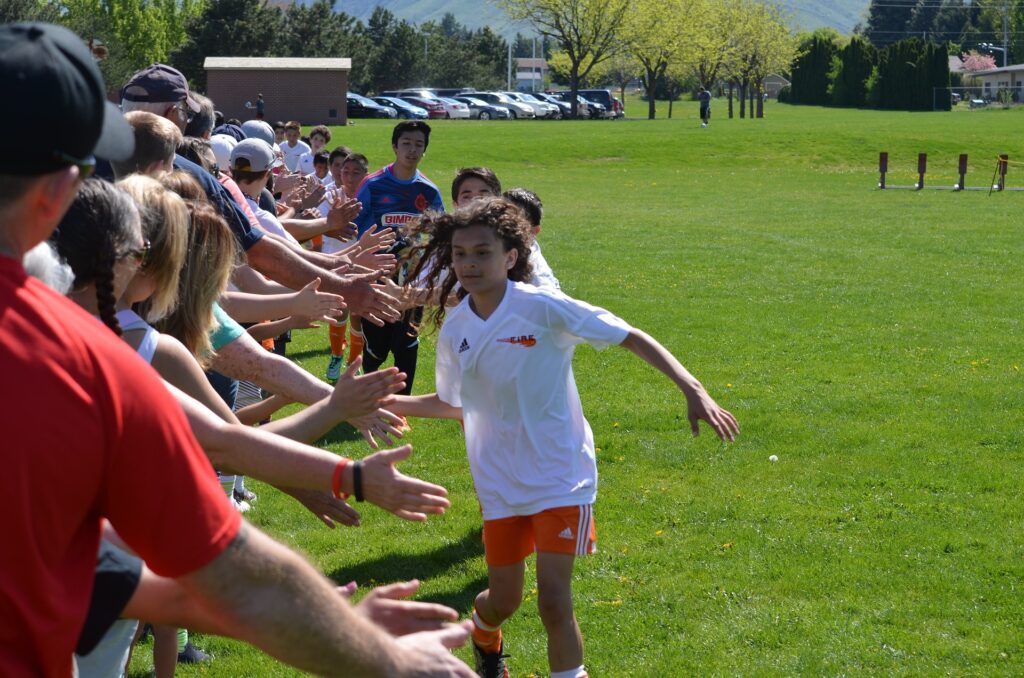
It is important to know the difference between being involved and micromanaging. While you should help players when necessary, they need to learn things themselves as well, and trying to teach them too much at once can lead to information overload. Don’t tell players what to do in every single situation, whether in games or practice. Instead, try to pick the right times and situations.
4. Experiment with Different Soccer Coaching Tips
Soccer is a very complex sport. There isn’t a formula that can instantly create a successful team or players.
Instead of sticking with one strategy and hoping players will eventually adjust to it, it’s best to try different strategies until you find a combination that works. Even the best managers in the world have to adjust their tactics and try new things over time.
If your team is struggling (or could be improved), try different tactics or play styles. Changing what drills you do in practice can help players improve and get a better understanding of the game. However, it’s important to make sure your players understand where they should play and what they should do, so try to keep things relatively simple and try not to change things too often.

Experimenting can also help players reach their full potential. Many of the world’s best players figured out their best positions on the pitch by trying many different kinds. For example, a kid who has always played in the outfield might excel in goal — like what happened to a young Manuel Neuer, who went on to become one of the top goalkeepers in the world.
5. Recruit an Assistant Coach
While you don’t need an assistant coach, it can be helpful for all kinds of coaches — especially for those coaching soccer with no prior experience. Whether the assistant has experience or is new to coaching youth soccer, having an assistant helps lighten the workload and can also provide an option to bounce some ideas off of.
Assistant coaches can be useful in a variety of ways. An assistant who is eager to help but less knowledgeable about the sport can help organize practices, motivate the players, and be team equipment manager.
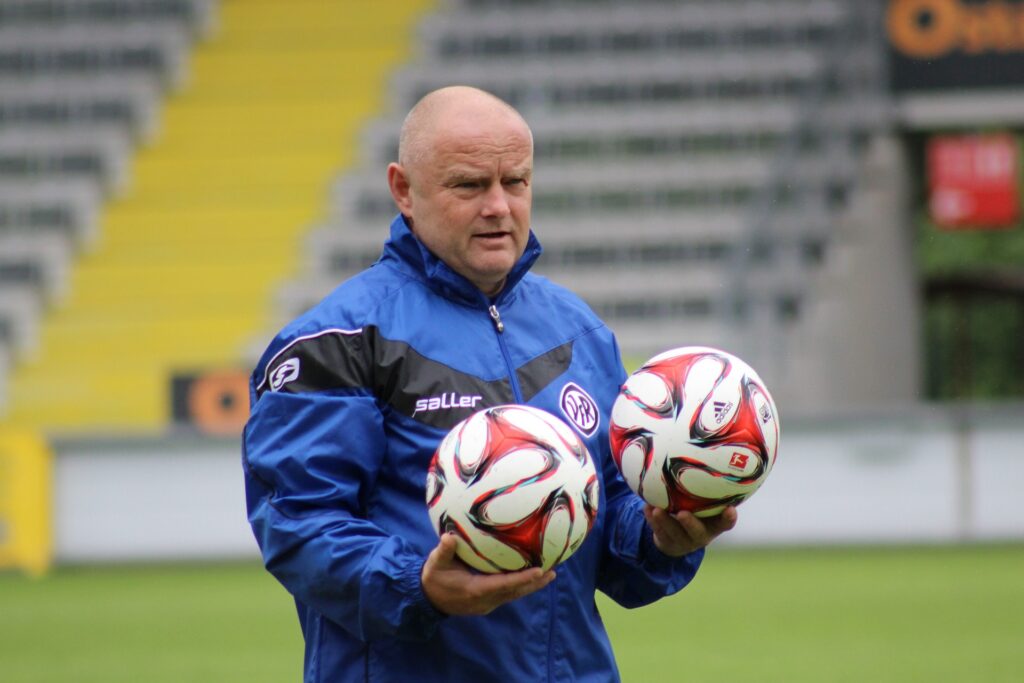
An assistant who is more tactics-oriented might have recommendations for where to play players, which formations to use, and which substitutions to make.
There’s no right or wrong answer for which type of assistant to look for.
There are different ways you can find an assistant. You can contact parents to see if they would like to be one, ask some of your close friends or family, or you may even be able to reach out to your league or season organizer to see if they have someone who would like to be an assistant.
You could even recruit your athlete’s peers or other students who are interested in coaching to act as an assistant coach. Just make sure you and your assistant coach are on the same page!
Of course, you don’t need to have an assistant coach if you don’t want one or don’t think that it is necessary. However, it’s something that any first-time youth soccer coach should consider.
6. How to Coach Youth Soccer — Have Fun
Ultimately, while it’s always nice to win, the goal of soccer is to have fun — not just for the players, but also for yourself. Don’t get upset with yourself if the team is struggling or if you think your gameplan isn’t working. Although everyone likes to win, the results aren’t necessarily what matters most. Your players will learn a lot more from you by watching you handle a defeat with grace and a constructive attitude than any yelling or after-match lectures.
The same is true for the players. You shouldn’t let players dwell on mistakes or bad results. Instead, teach them that every game presents a new opportunity and they should look forward to the future. If they play well, then praise them and show your appreciation — maybe with an award ceremony at the end of the season. Every coach should make sure that their players enjoy playing soccer.

Having fun can also help players improve. The more players enjoy themselves, the more likely they are to play with confidence and try new skills and tricks on the field. Players who aren’t having fun might be more focused on not messing up and making errors, which will prevent them from trying new things — and, worse, might make them consider quitting.
It’s also important to communicate this idea with the parents. Parents are very invested in their kid’s games, which is important but it can sometimes lead to frustration if the game isn’t going in their favor. This could result in parents acting out, either towards the coaches, players, or referees. Let the parents know that the point of youth soccer is to have fun and improve, and try to make sure they don’t get too many unrealistic expectations.
7. Watch and Learn
A good way to learn rules (besides looking at our website, of course) is to watch some soccer.
Whether that means going to support your local team or simply watching a game on TV, just watching to see how rules apply in different scenarios, or what may be called a foul can improve a new youth soccer coach’s knowledge of the game significantly. Which game or team you watch doesn’t matter, as the rules are largely the same from league to league.
If you have organizational support from your booster club and team parents, you could even organize a trip to see a professional game near you. Showing young soccer players the speed and skill at the professional level is sure to be an experience they remember for the rest of their lives.

Watching games can also help you get an idea of what your team should be doing — to an extent. Just because Manchester City can do something doesn’t mean you should try it, too, but you can still learn from the professionals. Observing how they use different aspects of the game like tempo, passing, and team shape, can give you ideas for your strategy and what you should focus on for drills.
Encourage your players to watch some games as well. The best player is a smart player, and watching games can help improve your player’s understanding of the game or Soccer IQ. Watching games can also help young players find role models and strengthen their love for the sport.
Watching games can help both players and coaches learn about different positions and their roles. This allows young players to see what the best players at their positions do on the field, while coaches can observe what each position does and how they move around from their respective positions both in attack and in defense.
8. Still Stressed? Turn to Resources
We built the Soccer Handbook with soccer coaches and for youth soccer coaches to help grow the beautiful game at every age and every level. We have resources on all things soccer including
For less than a cup of coffee each month, we also provide access to our full-season coaching plans. These plans provide you with 2 full practice plans per week for an 8 week season, an easy-to-understand database of drills, video examples, guidelines for running training sessions, and even game day help.
We have plans for every level from U6 through U14, and you can cancel your subscription at any time. We receive great feedback from new and veteran soccer coaches alike!
Learn More About Full Season Plans
And That’s Full-Time!
Coaching youth soccer is a fun and rewarding experience, but it can be a little daunting when you first start. However, it doesn’t need to be something you worry about. By using these eight tips, your job coaching youth soccer could become easier and more enjoyable.
And remember, it’s not just your players that grow and develop through soccer. It’s you too, coach.
